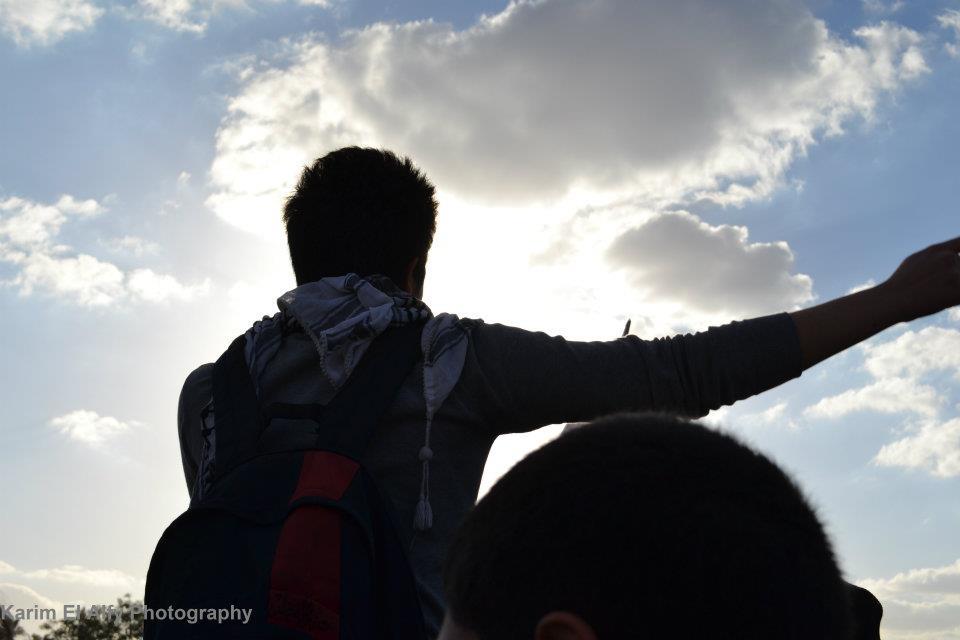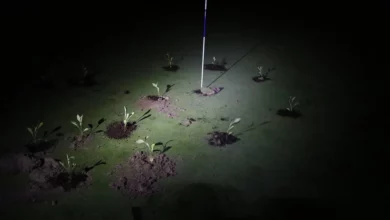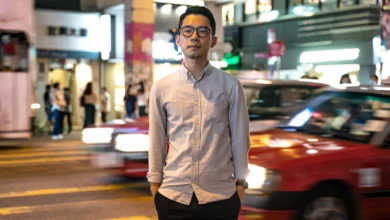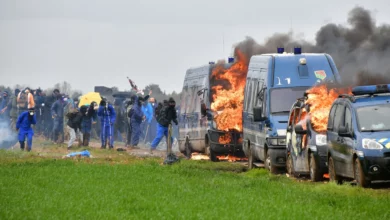
“We are the future of this country,” says Ahmed Malek, also known as Junior Malek, about people his age who are still in high school.
Malek is a prominent 17-year-old activist who was a leader in mobilizing the high school protests and strikes that took place on 11 February, the one-year anniversary of Hosni Mubarak’s resignation and just a few days after the Port Said football violence. But even before then, Malek could be seen on the front lines of clashes with the military, or organizing educational reform protests at the Education Ministry.
“Whether older people accept it or not, we will outgrow them, and spread, and eventually have some sort of control over most sections of society,” says Malek. “The more the youth realize this, and try to become informed, aware and able, the more promising the future of Egypt will be.”
Malek wants to study political science when he finishes high school, with hopes of getting into foreign policy, human rights or municipal government. In recent months, he has also become a member of the Revolutionary Socialists movement.
“I was only a leftist at first, but the more I learned about socialism, the more I saw myself having to align with their cause,” says Malek, who believes the movement’s interests have those of the nation at heart.
But even though he is extremely politicized, Malek is still a funny and lighthearted teenager, constantly smiling, laughing and making jokes. He also admits that his political interests are relatively new, and a direct result of the 25 January revolution.
Prior to the uprising in early 2011, Malek was thinking about becoming an actor, and was already somewhat well-known for playing the young Hassan al-Banna in the 2010 TV show, “The Brotherhood.”
“But all the while as I was growing older, like 14 or 15, I started to realize that things were off, particularly in school,” he says.
Malek, who lives in Mohandiseen with his family, attends Madinat al-Dawliya, a private school in Zamalek, which has an American educational curriculum.
“I didn’t understand why I had to be educated with an American system, and I questioned what was wrong with our own [public system],” he says. “But for a young person, before 25 January, it was hard to find older people and teachers to talk to you honestly about these questions.”
Malek says that he would mock the educational system and Mubarak with his friends, but was never able to really take his criticism beyond that.
But as he grew older, that frustration eventually turned into more concrete plans. He dreamed of joining the April 6 Youth Movement, one of Egypt’s most prominent pro-reform groups. But because he was so young at the time, he joined the only rebellious outlet he had access to: the Zamalek White Knights ultras.
“They were active and organized, and seemed disobedient and free, so I was drawn to it,” Malek says of the organization of football fanatics. “Then after 25 January, and the battles began, everything changed.”
To avoid clichés discussing the initial uprising and its effect on engaging Egyptians in politics, Malek fast-forwards to the July sit-in in Tahrir Square, where he says the high school political movement was born.
“This was when it became clear who the dedicated activists were, and we spent a lot of time discussing our individual lives, and for the first time I found other high schoolers, from other schools, who felt the same way,” he says.
Despite being in a private school himself, he says that important bridges were built with many other students at this time, from both public and private schools. He says they all generally agreed that Egypt’s current school system was horrendous, regardless of where you were.
“Either your parents have a bit of money, meaning you will most likely go private [school] and are therefore automatically unpatriotic and kind of detached from local culture, or they don’t and you go [to] public, where the education is terrible and the schools are falling apart,” he contends.
“The choices are patriotic poverty or unpatriotic privilege,” says Malek, though he admits that there are rare exceptions to this.
Another important agreement among the students was that they felt a personal duty to highlight and remove the “mini-Mubaraks” from high schools, says Malek, without giving any names.
Malek and his new friends from Tahrir started a Facebook page and a Twitter hashtag #s4c (students for change), and eventually organized their first protest at the Education Ministry in late September last year, demanding educational reforms. It was a bit disappointing, Malek says, with a turnout of only around 100 protesters.
The group decided to spread awareness in their schools, and compile a database of students and teachers who felt the same way they did. Meanwhile, clashes between activists and the security forces occurred on a monthly basis from October through February, leading to increased dissent against the Supreme Council of the Armed Forces as many young people were killed in the fighting.
For Malek, the November clashes were a turning point in his life, as he says he was beaten unconscious by the military, lost a lot of blood from his head, and was eventually sent to hospital, where his parents found out for the first time what exactly he had been up to all those months during the late nights he had said he was spending “with friends.”
Malek’s father, Malek Mostafa, is a prominent member of the Federation of Independent Trade Unions, while his mother is apparently anti-revolution. “They were really angry and worried, but in conflicting ways,” he adds, half-jokingly. “They just want me to graduate, above all.”
But once February rolled around, Malek was back on the streets. After violence at a football match in Port Said left 74 people dead, most of them Ahly ultras, many blamed the SCAF for the incident. And many of those killed were young people, breathing new life into the student movement.
Malek says that after the Port Said incident, they found hundreds of young students joining their Facebook page, which now has over 4,000 members, as opposed to 13 last July.
“I found many familiar faces from surrounding schools, and it was easy to mobilize and set up protests both in and out of the schools,” says Malek.
Although many of the new faces were joining as a statement against the SCAF, Malek says that they naturally aligned themselves with the educational reformist views of the group.
However, despite the high school protests and general strike not having any significant effect on politics, Malek believes this mobilization of young people will have two very important lasting effects.
“Firstly, many of us have bought respect from teachers, who usually talked to you and looked at you condescendingly, and taught you like a stupid kid,” he says, adding that now public school students argue with teachers in class against the ministerial curriculum. However, he also stresses that all teachers are different, and some deserve a lot of supportive recognition.
“Secondly, we now have a good database of not only thousands of students, but teachers looking to get involved in educational reform protests in the future,” he says.
For now, Malek says it is hard to maintain protests and momentum within the schools, particularly since these schools still control whether or not they will actually graduate, and that success would be to maintain a prolonged presence that can be passed down to younger students when his batch graduates.
“You have to maintain a balance between rebelling for reforms, but not getting singled out and having your future destroyed in the process,” he says. “But the goal is to make sure the youth realize their power, both now and in the future.”
Malek admits that he doesn’t actively force students to engage in politics and see his views, “but if I find someone hint at it or mildly interested, then I will push and encourage.” But Malek says that students have generally become more opinionated and vocal in schools since 25 January.
He also says that they are organizing to stage large protests, with teacher involvement, against the educational system and the SCAF after exams in the summertime. “We are planning something big, I can’t say much more yet,” he says.
Malek says he believes there is a new half-socialist, half-capitalist philosophy stirring in the youth of today. “I can feel it, but I can’t exactly explain it, but since the day I was born [in the mid-nineties] we have all been heavily connected [through the internet] in a new way,” he says. “We’re the first generation in history of this sort, and I think something huge is around the corner.”




